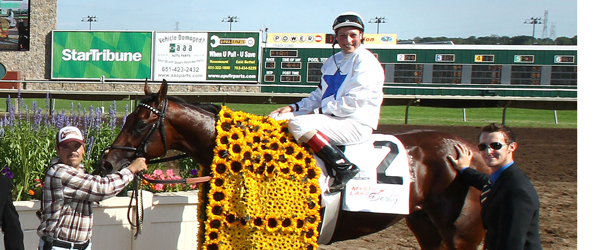 There has been much weeping and gnashing of teeth over the result of the Mystic Lake Derby and the decision by the state stewards, horse racing’s referees, to not disqualify the winner Hammers Terror and place him behind Delegation. Those taking sides reside in a few different camps: The Hammers Terror people who are pleased with the call; the Delegation folks who think it was the wrong ruling; and those that are still trying to figure out what the hell happened to Gung Ho.
There has been much weeping and gnashing of teeth over the result of the Mystic Lake Derby and the decision by the state stewards, horse racing’s referees, to not disqualify the winner Hammers Terror and place him behind Delegation. Those taking sides reside in a few different camps: The Hammers Terror people who are pleased with the call; the Delegation folks who think it was the wrong ruling; and those that are still trying to figure out what the hell happened to Gung Ho.
The situation is seemingly complicated by the fact that Hammers Terror, who undoubtedly came out on Delegation, was left in first yet the stewards the following day gave jockey Lori Keith a seven-day suspension for her ride. The two decisions are both within in the rules of racing; however, they do seem contradictory on the surface.
Those unfamiliar with the race can view the replay (below). Hammers Terror, just yards from the wire, abruptly shot to his right and into the path of Delegation. The stewards ruled, after deliberating for quite a few minutes, that the action did not cost Delegation a better placing nor did it change the outcome of the race. Had it happened 50 yards earlier perhaps the decision would have been the opposite, but that too is speculation. In the words of assistant trainer Chris Davis “That horse (Delegation) had the whole stretch to pass us and he didn’t.”
[youtube http://www.youtube.com/watch?v=B4h4mdSDbBo?rel=0]
The rules under which the state stewards operate are below. What applies to the situation at hand is this: If a horse or jockey jostles another horse such that it would affect the outcome of the race, the aggressor may be disqualified.
‘Affect the outcome of the race’ is the operative phrase. The decision has an element of subjectivity much like other sporting events. Ball or strike? The ump is a bum to some. Did Drew Pearson push-off? Vikings fans to this day insist so. In racing, the stewards, with training and years of experience, make the call and it stands. Hammers Terror wins the inaugural Mystic Lake Derby. Delegation is second. Their decision shall be final. Pay the man his money.
To those that needed Delegation on top, yes it sucks. We have all been there, not that it makes it any easier to accept. Your case is valid and a different combination of human beings may have made a different decision. After all, some group of people somewhere green-lighted Heaven’s Gate and Gigli didn’t they?
As for Lori Keith, she gets an unwelcome seven calendar-day vacation for either careless riding or not maintaining a straight path. Thus, yes, the stewards did rule she was at fault for poor riding; however, her poor riding did not alter the order of finish.
For your own consumption, here’s the Minnesota Racing Commission’s rules governing interference (the essential clause is underlined):
7883.0160 POST TO FINISH
Subp. 6.
Interference and willful fouling.
The following rules shall apply with respect to the running of a race.
A. When clear, a horse may be taken to any part of the course but no horse shall cross or weave in front of other horses in such a way as to impede them or constitute or cause interference or intimidation such that it would affect the outcome of the race.
B. If a horse or jockey jostles another horse such that it would affect the outcome of the race, the aggressor may be disqualified, unless the jostled horse or its jockey was partly at fault, or the jostling was wholly caused by some other horse or jockey.
Determination of disqualifications.
The stewards are vested with sole and complete power and authority to determine when a disqualification is proper, its extent, and whether it applies to any other part of an entry. Their decision shall be final.
A. In determining the extent of disqualification of a horse in any race, the stewards may either place the disqualified horse behind such horse as in their judgment the disqualified horse interfered with, or they may place it last.
B. When a horse of one ownership or interest is coupled with a horse or horses of the same or another ownership or interest, the disqualification of one will not necessarily affect the placing of the other.
C. In the event of a disqualification, the stewards, at the request of the owner of the disqualified horse, shall review the race with that owner within 72 hours of the race.
This blog was written by Canterbury Media Relations Manager Jeff Maday. Maday has filled multiple positions including Media Relations and Player Relations Manager since the track’s reopening in 1995.